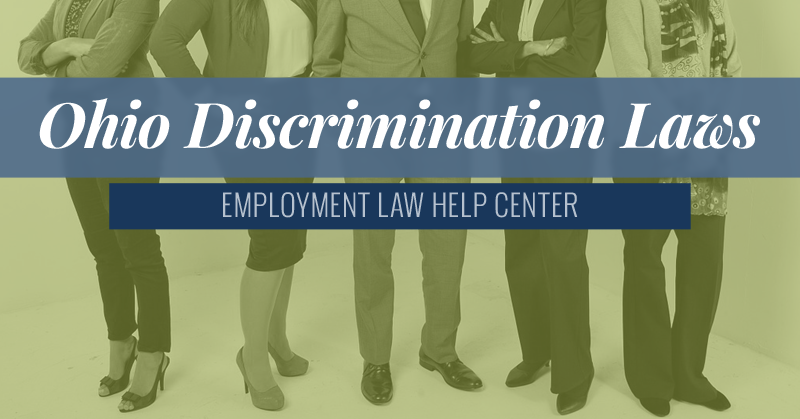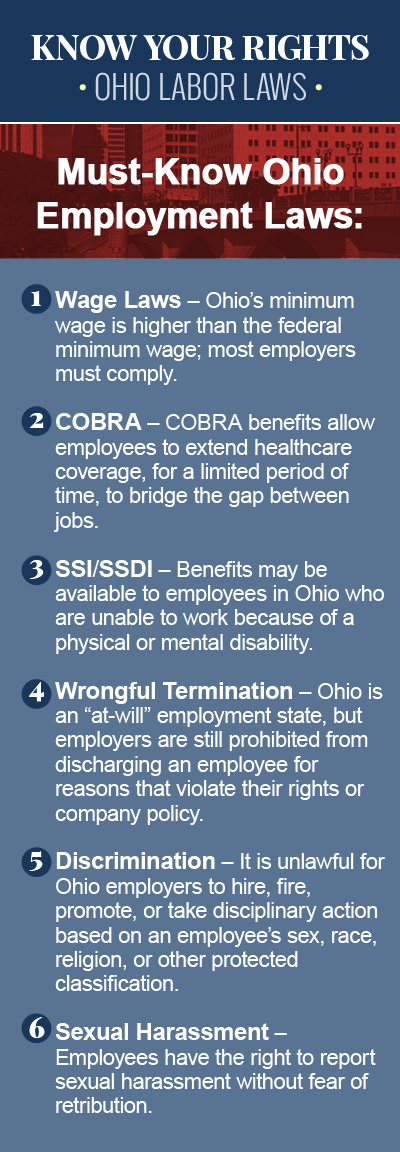Discrimination
Ohio is an “at-will” employment state, which means employers in Ohio are free to hire, fire, promote and pay employees however they see fit. What they aren’t allowed to do though, is base any employment decisions on an employee’s race, gender, age, religion, or any other protected characteristic, as this is considered workplace discrimination and is against the law. If you believe you have been the victim of workplace discrimination in Ohio, you may have grounds to file a discrimination claim against your employer. Unfortunately, pursuing a workplace discrimination claim can be a complicated process that requires specific steps be followed, such as obtaining a Right-to-Sue letter from the Equal Employment Opportunity Commission (EEOC). Contact an experienced Ohio workplace discrimination attorney today, to discuss your options for legal recourse.

Title VII and Protected Classifications
When Title VII of the Civil Rights Act was passed in 1964, it made it unlawful for employers to make decisions based on an employee’s race, color, sex, religion or national origin, and several laws passed in the years since have elevated new classifications to protected status. This means that employers are prohibited from firing, refusing to hire, failing to promote, taking wrongful disciplinary action against, or unfairly compensating employees based on the following protected classifications:
- Age
- Color
- Sex
- Race
- Religion
- Disability
- Ancestry
- National origin
- Marital status
- Political ideology

Recognizing Workplace Discrimination
Workplace discrimination can affect men and women alike, and may include decisions to promote, hire, fire, transfer or terminate an employee based on characteristics unrelated to job performance. Some common examples of discrimination at work may include denying a female employee a promotional opportunity because of her sex, underpaying a racial minority or limiting his or her opportunity for advancement, or wrongfully terminating an employee because of a physical or mental disability. Anti-discrimination laws prohibit employers from determining pay, disability leave, bonuses, time off or retirement plans based on any of the protected classifications listed above, and they also make it unlawful for employers to discriminate or retaliate against employees who report workplace violations, or exercise any other legal rights they have as employees. When it comes down to it, workplace discrimination is against the law, and no employee should have to face a prejudice of any kind that results in unfair treatment at work.
Pursuing Compensation for Discrimination in Ohio
Discrimination in the workplace is a violation of an employee’s basic rights, and has an adverse effect on everyone involved. Victims of discrimination may suffer financial hardships like lost wages and emotional distress resulting from harassment and a hostile work environment, and discrimination in the workplace can also lead to decreased morale and distrust among employees, or between an employer and his or her employees. Workplace discrimination can even have a negative impact on employers, and many companies have, in recent years, had to pay millions of dollars in compensation to victims of discrimination at work. If you have suffered workplace discrimination because of your race, sex, religious beliefs, or national origin, contact a knowledgeable discrimination attorney as soon as possible, to discuss your legal options.




